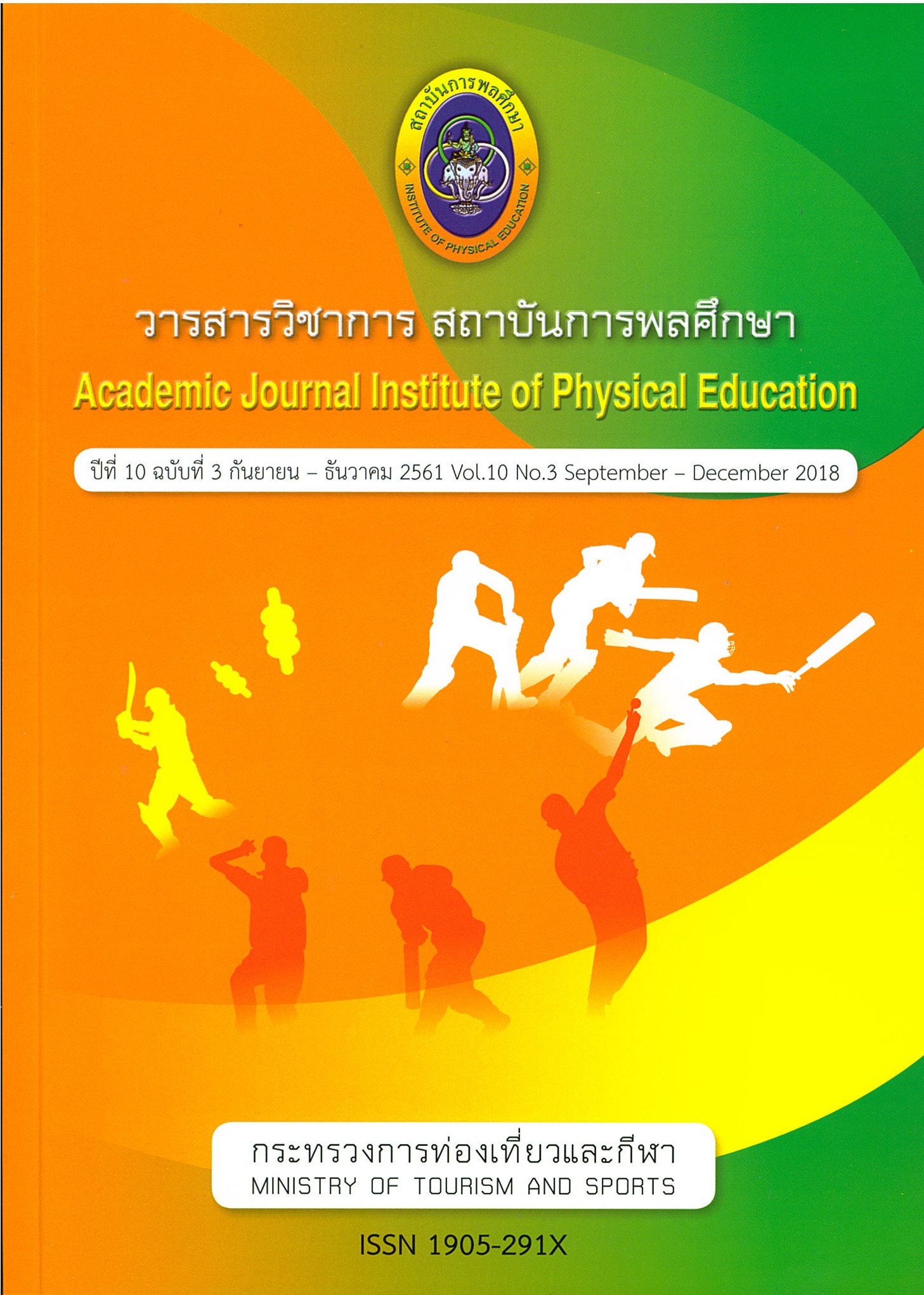The Study of the Students Personality Studying at The Institute of Physical Education, Central Region Campus: Based on The Transactional Analysis Theory
Main Article Content
Abstract
The purposesof this research weretostudythecharacteristicsof student’s personality of The Institute of Physical Education (IPE); Thailand Central region campus student’s personality of IPE and to compare The difference of students the samples were 370 bachelor students composted of 245 male students (66.2%) 125 female students (33.8%) their age are 18-30 yearsold. The instrumentof research was PAC questionnaire which was developed byresearchers (ContentValidityis0.98; reliabilityis0.82).The data wereanalyzed by mean, standard deviation, and to test One-way ANOVA
The results revealed the following: 1) There wasnot significantly different for the wholeaspect’s personality. Thehighest score was Adult ego state (A), the second runner up was Child ego state (C) and the third was Parent ego state (P) respectively 2) Male students have higher adult personality than female student at 0.05 level of significant difference 3) All students have higher Critical parent (CP) than Nurturing parent (NP) 4) Malestudentshavehigher Nurturing parent (NP), Critical parent (CP), Adapted child (AC) and Little Professor child (LC) than female students 5) The age of students was not effected to the whole aspect score of each aspect score of students, personality at 0.05 level of significant difference.
Article Details
The published article is a copyright of the Academic Journal of Thailand National Sports University. The passage appeared in each article in this academic journal is a perspective of each author which is not related to the journal. Each author is required to be responsible for all components of his/her own article. If there are any mistakes, each author must be responsible for those mistakes on his/her own.
References
ขนิษฐา วิเศษสาธร. (2552). รายงานการวิจัยเรื่อง การศึกษาบุคลิกภาพของนักเรียนสถาบันเทคโนโลยีพระจอมเกล้าเจ้าคุณทหารลาดกระบังตามหลักทฤษฎีทีเอ. กรุงเทพฯ: สถาบันเทคโนโลยีพระจอมเกล้าเจ้าคุณทหารลาดกระบัง.
ฐานิยา ตันตระกูล. (2553). ผลการฝึกการสร้างสัมพันธภาพตามแนวคิดวิเคราะห์การสื่อสารสัมพันธ์ของอีริคเบิร์น: กรณีศึกษานักเรียนเดินเรือพาณิชย์ ศูนย์ฝึกพาณิชย์นาวี. วิทยานิพนธ์ศึกษาศาสตรมหาบัณฑิต สาขาจิตวิทยาการปรึกษา. มหาวิทยาลัยธรรมศาสตร์, กรุงเทพฯ.
ดุลยา จิตตะยโศธร. (2552). รูปแบบการอบรมเลี้ยงดู:แนวคิดของ DianaBaumrind (DianaBaumrind’s Parenting Styles). วารสารวิชาการ มหาวิทยาลัยหอการค้าไทย, 29(4), 173.
ทิศนา แขมมณี และคณะ. (2535). หลักการและรูปแบบการพัฒนาเด็กปฐมวัยตามวิถีชีวิตไทย. กรุงเทพฯ: โรงพิมพ์แห่งจุฬาลงกรณ์มหาวิทยาลัย.
มหาวิทยาลัยรามคำแหง. (2559). บทที่ 3 พัฒนาการวัยรุ่น. (ออนไลน์). สืบค้นเมื่อ 20 สิงหาคม 2559. จาก http://e-book.ram.edu/e-book/p/PC422/chapter3.pdf
พระราชบัญญัติการศึกษาแห่งชาติพ.ศ. 2552. (2559, 19 สิงหาคม). ราชกิจจานุเบกษา. เล่ม 116 ตอนที่ 74 ก หน้า 7.
พิมพ์หทัย สังสุทธิ. (2556). “ความแตกต่างระหว่างเพศชายและเพศหญิงกับการกระทำผิดเกี่ยวกับทรัพย์: ศึกษาในแนวทางของทฤษฎีความกดดันทั่วไป ทฤษฎีการควบคุมตนเอง และทฤษฎีความผูกพันทางสังคม”. วารสารวิทยบริการ, 24(3), 59-81.
วราภรณ์ ขุนอินทร์. (2541). การพัฒนาบุคลิกภาพผู้ติดเฮโรอีนตามทฤษฎี TA ณ สถานฟื้นฟูสมรรถภาพผู้ติดยาเสพติด ประเวศ (บ้านพิชิตใจ). วิทยานิพนธ์วิทยาศาสตรมหาบัณฑิต สาขาจิตวิทยาการให้คำปรึกษา. มหาวิทยาลัยรามคำแหง, กรุงเทพฯ.
วัชรี ทรัพย์มี. (2549). ทฤษฎีให้บริการปรึกษา. พิมพ์ครั้งที่ 4. กรุงเทพฯ: โรงพิมพ์แห่งจุฬาลงกรณ์มหาวิทยาลัย.
วีระเชษฐ์ ผ่องพันธ์. (2546). ผลการให้คำปรึกษาแบบกลุ่มตามแนวทฤษฎีการวิเคราะห์การติดต่อสัมพันธ์ที่มีต่อการปรับตัวทางสังคมของนักศึกษาวิทยาลัยพลศึกษา จังหวัดมหาสารคาม.การศึกษาค้นคว้าอิสระ ปริญญาการศึกษามหาบัณฑิต สาขาจิตวิทยาการให้คำปรึกษา. มหาวิทยาลัยมหาสารคาม, มหาสารคาม.
ศิริกุล อิสรานุรักษ์ และปราณี สุทธิสุคนธ์. (2550).การอบรมเลี้ยงดูเด็ก.วารสารสาธารณสุขและการพัฒนา, 5(1), 106-108.
ศรีเรือน แก้วกังวาล. (2545).“วัยรุ่น”จิตวิทยาพัฒนาการทุกช่วงวัย. พิมพ์ครั้งที่8.กรุงเทพฯ: มหาวิทยาลัยธรรมศาสตร์.
สมเกียรติกาทองทุ่ง. (2557). “แนวทางการพัฒนาสมรรถนะของอาจารย์พลศึกษาในสถาบันการพลศึกษาเพื่อขับเคลื่อนสู่ประชาคมอาเซียน”. วารสารอิเล็กทรอนิกส์ทางการศึกษา, 9(2), 144-158.
อาภา จันทรสกุล. (2535). ทฤษฎีและวิธีการให้คำปรึกษา. พิมพ์ครั้งที่ 4. กรุงเทพฯ: มหาวิทยาลัยเกษตรศาสตร์.
Berne, Eric. (1961). Transactional Analysis in Psychological. New York: Grove Press, Inc.
Castle, C.S. (1913). A statistical study of Eminent Women. Washington: Science Press.
Cattell, R.B. (1950). Personality: A Systematic Theoretical and Factual Study. New York: McGraw–Hill.
Williams, K.B. and Williams, J.E. (1980). The assessment of Transactional Analysis Ego States Via the Adjective Checklist. Journal of Personality Assessment, 44(2), 120.
Yamane, Taro. (1970). Statistics: an Introductory Analysis. Tokyo: John Weatherhill


